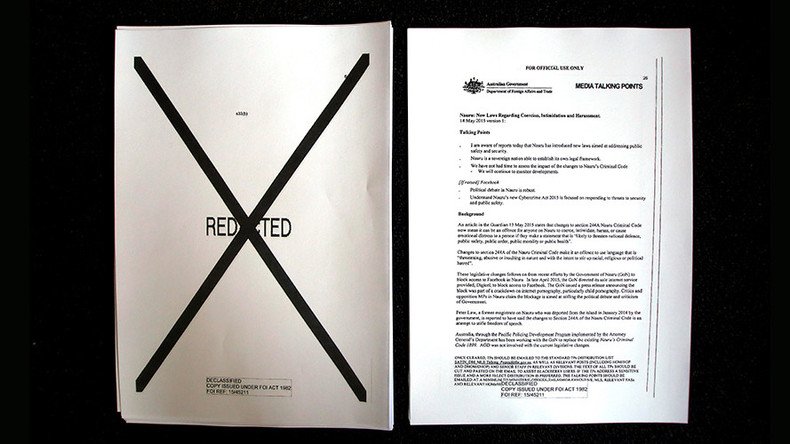Errant, not transparent: Docs reveal Obama admin. tried to ‘kill transparency’ – advocacy group

President Barack Obama has touted his administration as the “most transparent ever,” but the Freedom of the Press Foundation says documents released under a Freedom of Information Act lawsuit show an effort to “kill transparency.”
The non-profit Freedom of the Press Foundation sued the Department of Justice (DOJ) for documents detailing its correspondence with Congress regarding the reform of the Freedom of Information Act (FOIA) that failed to pass Congress last year despite strong support from legislators. The lawsuit itself was filed in compliance with the FOIA, a law enacted to improve openness in government.
DOJ grants immunity to Clinton staffer who set up personal email serverhttps://t.co/D7YF0Vuq3dpic.twitter.com/DKrqJ6MDHy
— RT America (@RT_America) March 3, 2016
In 2014, the FOIA Oversight and Implementation Act (FOIA Act) sought to make receiving information faster and easier. The FOIA Act breezed through the House of Representatives with unanimous support, and a similar bill, The Freedom of Information Improvements Act, was passed by the Senate. However, the legislation failed in Congress after members failed to reconcile the differences between the two bills.
With both bills receiving bipartisan support, it seemed odd for them to die on the vine. The Senate version was modeled after the DOJ’s own policy of transparency set in 2009 by a memo from Attorney General Eric Holder.
“[T]he Department of Justice will defend a denial of a FOIA request only if (1) the agency reasonably foresees that disclosure would harm an interest protected by one of the statutory exemptions, or (2) disclosure is prohibited by law,” the 2009 Holder memo read.
However, the Freedom of the Press Foundation published a memo from the DOJ showing that it had lobbied against almost all aspects of the bills – despite the fact that its own guidelines were the basis for one. The DOJ, speaking on behalf of the entire Obama administration, wrote “The Administration strongly opposes passage of [the FOIA Act].”
Specifically, the DOJ’s talking points against similar provisions in the FOIA reform bills run counter to the part of Holder’s 2009 memo stating that when “disclosure would [do] harm,” the DOJ would defend its decision to deny a FOIA request in court.
In the 2014 memo from the DOJ, the first major concern surrounds “foreseeable harm,” but the concern this time was that the language had been included in the legislation at all, because it opened up the DOJ to more potential lawsuits, in which the “forseeable harm” case would have to be made to a judge.
“This addition would vastly increase FOIA litigation and would undermine the policy behind each of the existing exemptions,” the 2014 memo read.
Ironically, this memo was only released following three months of lawsuits from the Freedom of the Press Foundation.
The 2014 memo goes on to say that including foreseeable harm would “require judges to determine, on a document-by-document basis, whether disclosure of a record protected by an exemption would cause ‘identifiable harm,’” meaning, a judge would determine whether or not the administration’s claims of foreseeable harm were true – much like what a judge does in any other case.
Efforts to expedite requests through a singular website were also met with resistance from the DOJ, despite the fact that “the Administration believes that it is beneficial to study the feasibility of establishing a single website for the making of FOIA requests… and has already committed to doing so.”
Despite the administration’s stated intention to create such a site, the memo concluded that it “would be counterproductive to mandate establishment of a pilot program, with required participation by multiple agencies.”
Obama started off his presidency by instructing all federal agencies to operate under the “presumption of openness,” but five years later, his administration lobbied to keep the public in the dark.












